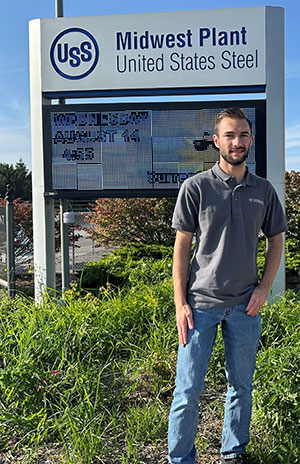2024 Steel Intern Scholarships - Ronald E. Lincoln

David J. Holleman
I have been an intern since May 2023 on the IT Plant Systems Quality team at the U. S. Steel – Midwest Plant in Portage, Ind., USA. I plan to continue in this position through my graduation in December 2024. This invaluable opportunity has taught me a lot about the steel industry and working as part of a team. Throughout most of my time here, I have been reporting to Joseph Petrovich, but due to recent organizational changes, I am now reporting to Casey Holtzman as part of the Enterprise Manufacturing Solutions MES team.
During this internship, I have been working as a software developer updating legacy systems to more modern solutions, adding new features to existing applications and creating new services to be used in the field. I have been able to gain experience in Java, C#, VB.NET, VB6, HTML, PHP and SQL. I have also had the opportunity to work with Docker containers, use multiple different development environments, explore using artificial intelligence for software development, and collaborate with other developers using tools like TFS and Git.
At the beginning of my internship, my focus was on learning the systems and processes used at the company. As part of this process, I created diagrams as documentation for a few programs, cleaned up the list of applications, and improved related documentation for applications which the team supports. This was a great introduction and allowed me to quickly be able to move into a more development focused role.
 One of the projects that I have worked on at U. S. Steel has been updating old Visual Basic 6.0 applications to C#. Many of these have been running for decades but have become much more difficult to maintain as the tools go out of support and have caused some cyber security concerns in more recent years. Using my existing knowledge, experience gained while on the job and a private LLM, I was able to rewrite many of these old programs using a much more modern and maintainable solution.
One of the projects that I have worked on at U. S. Steel has been updating old Visual Basic 6.0 applications to C#. Many of these have been running for decades but have become much more difficult to maintain as the tools go out of support and have caused some cyber security concerns in more recent years. Using my existing knowledge, experience gained while on the job and a private LLM, I was able to rewrite many of these old programs using a much more modern and maintainable solution.
Another project that I worked on was rewriting a hastily put together Java program that was used for storing and relaying information about how long a particular line was running during each shift. I wrote the replacement in C# to run on the .NET framework to work more cohesively with the rest of the applications that it interacted with. Along with this change, I was also able to move it from an older plant server to a more modern server at the headquarters level.
There are a couple of larger Java applications being used by the metallurgical testing lab at a plant in Michigan that I have made changes to as well. These programs are used for conducting tests on the materials that we produce and creating reports that can be used for our own records and can be given to the customers. For one of the applications, I needed to add the ability to generate and print off a different type of report that a customer was requesting. The other application, which is used for conducting the tensile tests, needed to be updated to a newer version of Java and be given the ability to accept a few new test codes.
More recently, I have also been working on a couple of containerized .NET micro services. The one that I have been working on the most is for being able to take in a material id, trace the genealogy back to its original plant that it was created at, and get the chemistry data for any heats that made up the final coil. This is very important so that we can report all the information about the chemical makeup back to the customer if they need it.
Throughout my time at U. S. Steel, I have had the opportunity to visit many of the manufacturing facilities including the hot strip mill, pickle lines, cold mills, annealing units and coating lines. My time here has also allowed me to work directly with our internal customers who utilize the systems I developed or maintained.
In addition to the development work that I have been doing, I have also conducted many training meetings and other knowledge transfer related tasks. This was necessary because a lot of our teams’ maintenance-related activities were being transitioned over to offshore resources who needed to be taught how our systems operate and what they might need to do to keep everything running smoothly.
My internship with U. S. Steel has been a great opportunity that has allowed me to learn a lot and use that knowledge in a professional setting. While I have grown in my working knowledge of many software systems, one of the most valuable parts of this internship has been the ability to further develop my interpersonal skills and working with a team to implement meaningful changes.
